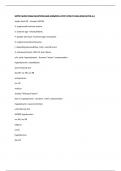SEPTIC SHOCK EXAM QUESTIONS AND ANSWERS LATEST UPDATE 2024-2025 (RATED A+)
septic shock RF - Answers SEPSIS
S: suppressed immune system
E: extreme age- infants/elderly
P: people who have received organ transplant
S: surgical procedure/invasive
I: indwelling devices(foley, trach, central lines)
S: sickness(chronic): DM, RF, liver failure
s/sx early: hyperdynamic - Answers "warm" compensation
hyperdynamic: vasodilation
warm flushed skin
dec BP, inc HR, inc RR
temperature
inc CO
restless
anxiety "feeling of doom"
late sx: hypodynamic - Answers "cold" compensation
hypodynamic: vasoconstriction
cold clammy skin
SEVERE hypotension
inc HR, inc RR
oliguria
coma
hypothermia
dec CO
,(body trying to compensate for overwhelming process! toes blue, extremities not important, shunts to
more important organs!)
interventions - Answers (to prevent going to ICU!) inc perfusion: fluid replacement(LR), vasopressors
oxygenate(heart wants what it wants!): O2 sat >95%-risk of ARDS
fight microorganism: start cultures, abx(doesn't matter which one first-broad spectrum usually!)
dec inflammation: low dose CORTICOSTEROIDS
nutrition: maintain GI integrity-dec risk of ulcers(protonix-PPI, STRESS ulcers!)
control blood glucose(rises at first, may need INSULIN!)
sepsis - Answers invasion of microbe overwhelming the body
usual cause: bacteria. fungus, viruses, parasites.
tx - Answers SEPTIS
S: start abx within 1st hour(want cultures but don't delay tx to get this, prefer get before bc can throw
off but don't wanna delay process! go ahead and hang abx!)
E: enteral nutrition(corpak) and protonix, tube feeds, IV pepcid(if old-school doctor)
P: protein activated C(Drorecogin alpha-*watch for bleeding*(bleed FIRST from *GI*)
T: titrate vasopressors(MAP >65, ie: norepinephrine)
I: inotropic-dobutamine(increase CO, helps heart beat more effectively)
C: crystalloid/colloid(crystalloid: LR, fluids first!!!), then switch to NS.
how do you know it's working? BP stabilizes, doesn't: BP goes down.
tx: SHOCK - Answers S: steroids: low dose(decreases inflammation)
H: hemodynamic monitoring-MAP(and BP)
O: oxygenate sats >95%(risk for ARDS!)
C: cultures before abx(preferably, usually takes 24h later, then start vanc-broad spectrum, pharmacy
doses! want to know BUN/creatinine, GFR, renal function too!)
K: keep blood glucose controlled
KEEP THEM ALIVE!
, keep monitoring UOP: foley(and foley is one of causes!!! but have to know if KIDNEYS start failing! UOP
<30mL/hr(bc if fluids build up-usually fill to lungs!)
*on PCU/ICU because it's such a high risk! 1/3 die!*
RF, case study - Answers elderly, productive cough-asthma(infection!), RF-elderly, infants, chronic
diseases-asthma, psoriasis(usually linked to immune issue), risk PNA!
-if cultures NEGATIVE in 24h, let cultures sit/grow another 24h! low BP, pos blood culture now(would
have bolused by now to see if can fix early)
-draw one blood culture in ED, another in morning
what to do next? bolus, have cultures(give abx), should have already been on broad spectrum
now(change abx when come back for gram neg/pos)
case study - Answers sepsis protocol, hospitals have protocols
draw 2 lactates, bolus, broad-spectrum abx, hgb low(but getting chemo, can run low with this, but
shouldn't have fever), draw 2 lactates
pearson notes: sepsis - Answers sepsis, septicemia, bacteremia, septic shock, blood poisoning-WHOLE
body inflammatory process resulting in acute critical illness!
SIRS - Answers in 1992, critical care definition. body's RESPONSE to critical illness from infectious OR
noninfectious cause(burns, trauma, pancreatitis!), WHOLE body inflammatory process.
-sepsis: SIRS from an INFECTION
-severe sepsis: sepsis with ACUTE associated ORGAN failure
-septic SHOCK: persistent low MAP as result of INFECTION despite giving fluids.
-REFRACTORY septic shock: persistent low MAP despite VASOPRESSOR therapy/fluids.
infection related SIRS: sepsis - Answers patho: LEADING cause of death in non cardiac ICU, more than
1/2 over age 65! SIRS which is precursor to sepsis, can occur as complication of INFECTION of ANY body
tissue!
infection related SIRS - Answers infection triggers SYSTEMIC inflammatory response that leads to
ADVERSE events: VASODILATION, inc CAPILLARY permeability, HYPERcoagulability.
-triggers plts, neutrophils, macrophages, endothelial cells(these cells activated during
immune/inflammatory reaction), but with SIRS, the function of these cells is EXAGGERATED! cellular
release of chemical mediators sparks a SYSTEMWIDE immune/inflammatory response!
SIRS response - Answers when severe, SEPSIS can develop!(from systemic inflammatory response), DIC is
potential RISK with SEPSIS!




